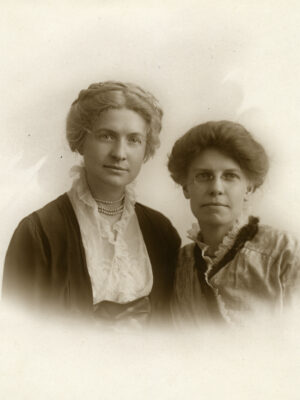Out of the Kelley House Archives comes the story of Miss Ethel Nelson, born in Mendocino 1883, daughter of Elizabeth May (Bessie) Carlson and Captain Henry Nelson, owner of the Wilson Hotel on Main Street in Mendocino, as well as ship captain for the barkentine, Servia. Henry and Bessie married in Mendocino on January 18, 1882.

She was the granddaughter of a pioneer who brought a complete sawmill around the Horn in a sailing vessel. Ethel never married, instead pursuing a career in Pharmacy. She graduated from the University of California Pharmacy School in 1904.
Ethel recalls, “Yes, I used to go to sea with my father, and I guess it’s in my blood. It was on a ten-month trip to Australia with him that I decided to become a pharmacist. It was an unusual field for a girl, but then, it was unusual for a girl to go to work at all in those days. But my father said to me, ‘If worst comes to worst, you can always go out in the country and open a little drugstore’!
Those were the days when the big glass jars of green and red fluid you see on a druggist’s shelves were more than decorations. She made her own pills, rolled them out and cut them, and kept crocks of laxatives and quart jars of infusions of digitalis.
Whoever said, “a man’s work lasts from sun to sun, but a woman’s work is never done!”, could have had Ethel Nelson in mind. After gaining experience in private pharmacies in San Francisco and West Alameda, she worked at the Samuel Merritt Hospital of Oakland. There, Ethel was on 24-hour duty and lived in a room next to her dispensary. She allowed herself to be a test case for the hospital, which felt they might have to hire men as pharmacists and appealed the new eight-hour per day women’s work law. The law was attacked by the nurses of Merritt Hospital at the time it was first passed, and the protest went through several courts.
Taking her case through court after court in an effort to retain her means of livelihood, Ethel Nelson carried her fight before the Supreme Court of the United States in an effort to have the California eight-hour law for women set aside at least as applied to student nurses and pharmacists. According to the Oakland Tribune, “Miss Nelson has appealed to the Supreme Court to set aside the state law as unconstitutional, on the ground of discrimination in favor of men. The nurses hold that their profession, being filled with necessities for emergency calls, cannot be regulated by time unless illness can. Should the Supreme Court decide that the law is constitutional, hospitals must put on more nurses, and pharmacists, or employ men to take their places, there being no limit on a man’s hours of duty.”
Though the appeal lost, Ethel can be credited for advancing woman’s working conditions. She was a founder of the Women’s Pharmaceutical Society of the West, which honored her on her retirement. By the time Ethel passed away at age 75 in Oakland on February 6, 1960, thousands of women were employed as pharmacists, often devotedly working long hours.
In her late years, she frequently returned to visit her childhood home of Mendocino and rekindled her girlhood love of the sea.
A celebration of the 101 years since women won the right to vote in 1920 will take place at the Kelley House Museum lawn on Saturday, August 21. A parade begins at 1:00, immediately followed by a program featuring State Treasurer Fiona Ma, Fort Bragg City Councilmember Tess Albin-Smith, Mendocino Women’s Choir, speakers on current issues and the arts, and “appearances” by historical figures. Presented by the League of Women Voters of Mendocino County, Mendocino Women’s Political Coalition, Soroptimists, and the Cloud Forest Institute. Bring a chair.